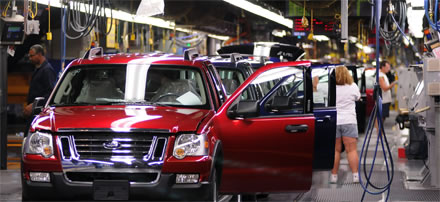Posted November 20, 2008

Spread the demand: Bail out People, not Wall Street!. Around the edge, these 2 1/8″ buttons read “Free Health Care,” “Defend Public Services,” “Living Wage Jobs,” “Free Higher Education,” “Troops Home Now,” “Rebuild the Gulf Coast,” and “Affordable Housing.” If you don’t have paypal, email us!
by Dianne Feeley
After years of opposing mass transit systems and fuel-efficient cars, the Big Three find the time is running out in a competitive international market where the products they sell aren’t the ones people want. Now they cry that they are running out of money and all have their hands out for a bailout. If you listen to the debate, it’s all about whether the industry should survive or be allowed to go under. Rarely are the workers who make the products mentioned, but when we are, it’s often some mantra about how there has to be equality of sacrifice, suggesting it’s time to reopen contracts and reduce our wages, benefits and working conditions. Yet even with all the layoffs and buyouts, there are more than 500,000 autoworkers. About 125,000 are assembly workers and about 415,000 work in the auto parts industry. Altogether workers in the auto and related industries total 3.1 million U.S. workers.
More Concessions in the Offing?
UAW President Ronald Gettelfinger testifed on behalf of the Big Three, but said he wants to hold the line on any concessions, declaring that the 2007 contracts were “transformative.” The contracts were historic all right, but it was a huge backward step as permanent two-tier wages and benefits were introduced for new hires and the union got the Big Three off the hook by agreeing to administer what is almost certainly an underfunded health care VEBA.

In fact, the Big Three and all the other U.S. companies complain about what a drain health care coverage is for their work force. According to Labor Notes, General Motors is the largest private purchaser of U.S. health care, providing coverage in 2004 to a million people for a cost of $5.3 billion. CEO Rick Wagoner pointed out this was more that GM paid for steel. Yet for all its griping about covering active workers, retirees and their families with health care, claiming that this coverage adds $1500 to the price of every vehicle, GM has been unwilling to advocate for the kind of universal coverage its workers in Canada have.
The solution isn’t more patchwork on an already outmoded and inefficient health care system, but an immediate extension of Medicare to the entire U.S. population. Such a program would cut out the enormous profits sucked up by insurance companies today and provide better, and universal, coverage at two thirds the cost. (A health care tax on all companies – less than what companies who provide health insurance now pay – would provide the majority of the funding.)
A second area that the Big Three claims it can no longer afford is pensions for retired workers (although it doesn’t make that assertion for top management). Unlike the situation of health care, where a single payer plan has been introduced into Congress (HR676), the discussion about how to provide for retirees is just beginning. One solution is obviously to dramatically revamp Social Security, with benefits high enough so that private pensions would not be necessary. Immediately, however, pensions could be extended throughout the transportation industry, thus increasing the number covered while significantly containing the cost until a not-for-profit universal plan can be developed.
Who Can Solve The Crisis?
Autoworkers did not cause the crisis in the industry and should not have to pay for management’s mistakes. U.S. autoworkers are very productive, but we don’t have a way to make the decisions about what we produce. Most of us know how we could do the job better –in fact our plant “team” meetings are about getting us to give advice to management so that they then decide whether to act upon the ideas or not. But management makes all the decisions and they are made on the basis of profitability.
As workers, consumers and members of the community we have a larger vision. Many of us know that while SUVs and trucks were highly profitable products for the companies, these gas guzzlers aren’t safer than smaller, more fuel-efficient cars or healthy for the environment. Eventually such a production model would result in a glut on the market.
We don’t agree with our union that, to save our jobs it’s necessary to support lower fuel efficiency standards. We don’t believe that we have to choose between our jobs and our health. We have the right to decent jobs and a healthy environment for ourselves and for future generations.
We’d like to propose a different management model for the bailout.
- Put the workers who design and produce the products front and center. Let the management team go and let us elect the production and research team. With the input of consumers, urban planners and environmental researchers, we could develop a transportation industry capable of retooling for our 21st century needs.
- Convert the excess plants in the auto parts sector to useful green jobs. We need to create solar, wind and geothermal energy. Axle plants, for example, can be converted to produce wind turbines, a product not currently made in the United States.
Autoworkers, both unionized and non-union, not only support ourselves and our families but create something like seven more jobs for each one of ours. We want to continue contributing to our society by not only building products but building more socially useful ones.
There’s every reason why workers in the other industries and workplaces would want to come together and take over planning as I’ve suggested we could do. We are the ones that create, transport and sell the product. Management has demonstrated its inability to plan production. But that’s no reason to allow the economy come to a standstill. Let’s roll up our sleeves and get to work!
Previous front page: Obama’s Dual Mandate
Dianne Feeley is a retired autoworker in Detroit.
